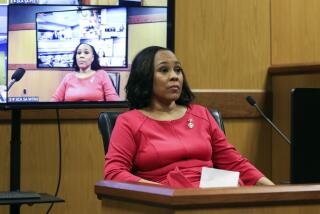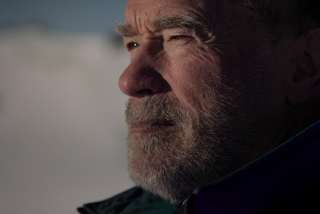Public Split on Whether to Believe Willey, Clinton
- Share via
WASHINGTON — It is the question that Americans are asking from coast to coast: Could the same woman who fended off President Clinton’s unwelcome sexual advance, as Kathleen E. Willey says she did, also have subsequently written the very friendly letters that Willey sent Clinton?
The public, according to the first polls since Willey’s description on CBS’ “60 Minutes” Sunday of her 1993 encounter with Clinton, appears evenly divided over whom to believe.
While the public’s view is murky, the experts say it is not at all implausible that former White House volunteer Willey was the victim of a crude sexual pass by Clinton but continued to pursue a friendly relationship with him.
The White House is attempting to raise questions about Willey’s veracity by releasing a series of chatty correspondence in which she continued to seek favors from Clinton long after the November 1993 incident she described in the nationally televised interview.
“On the one hand, she wants to make it clear that she finds the behavior unacceptable,” said Amy Oppenheimer, an attorney in Berkeley who trains employers and employees and testifies as an expert in sexual-harassment cases. “But, on the other hand, she needs to make it clear that she’s not going to betray him, she’s not going to cut off the relationship and she still wants the advantages of knowing him. I think that’s a really understandable reaction.”
Nor do the experts put much stock in the fact that Willey’s attorney tried to sell Willey’s autobiographical book for $300,000. The president’s lawyer and aides have questioned whether that fact proves that she had a financial motive for telling her account.
In typical sexual-harassment suits, women are “expected to be caricatures of purity,” said K.C. Wagner, another sexual-harassment expert. She added that women can be complicated characters but still tell the truth about harassment.
The experts stressed that they did not have enough information about Willey to reach a conclusion about the truthfulness of her claim that Clinton groped her and placed her hand on his genitals when she sought his help in obtaining a paying job.
*
But they found her account believable, and no less so because she subsequently maintained a relationship with the president.
“He’s the president of the United States. If you have a friendly relationship with him, that’s possible access to a brighter future. If you have a choice between cutting off that relationship or trying to keep it going, many people are going to decide to put out of their minds one appalling incident,” Oppenheimer said. “The American public has done that with President Clinton. We know he’s a philanderer. On the other hand, we like what he is doing for the country; so we’re putting up with him.”
The latest polls reflect that split. Clinton’s job approval ratings remain at lofty levels. In a CBS poll and one conducted by Gallup for CNN and USA Today, Clinton’s job approval rating actually rose in the past week, up three percentage points in CBS and four points in Gallup to an identical 67%.
At the same time, the polls showed voters almost equally split between those who believed Willey’s account and those who accepted Clinton’s denial that anything inappropriate took place. And large majorities say they do not believe the president has high moral standards.
“Up to this point, the public has concluded that there’s a difference between private behavior and public behavior,” said Stuart Rothenberg, a political commentator in Washington. Willey’s allegations matter, he continued, “to the extent that the wall is breached.”
White House officials interpreted the initial poll results cautiously. “There is concern here about the impact on public opinion--but no reason yet to believe that it has had an impact,” said one high-level aide.
*
The White House effort to debunk Willey’s story reminded some of the 1991 battle over the nomination of Clarence Thomas to the Supreme Court. When Anita Faye Hill, who had formerly worked for Thomas, accused him of sexual harassment, Thomas’ partisans tried to discredit her by pointing out that she had continued to work with him.
In both cases, the experts said, the women were following a well-trodden trail by keeping their mouths shut and continuing to hope that they could retain professional relationships with the influential men. Wagner, who trains employers to deal with sexual harassment for Cornell University’s school of industrial and labor relations, said victims typically think:
“I don’t want to encourage the behavior, but I don’t necessarily want to discourage interaction, because there are benefits to having a good working relationship.”
“In principle, there’s not necessarily a contradiction” between Willey’s story and her correspondence with the president, Wagner added. “I felt the same way about Anita Hill.”
Sen. Barbara A. Mikulski (D-Md.), an outspoken defender of Hill who has been sought out by reporters for comment on Willey’s allegations, issued a statement Tuesday afternoon enumerating several “principles” that guide her in deciding whether to speak out on allegations of sexual misconduct.
Echoing a sentiment shared by many representatives of women’s groups in Washington, Mikulski said she was remaining silent because a legal process was in place to judge Willey’s charges. “I want the facts to speak for themselves,” she said. “These are disturbing allegations.”
*
House Majority Leader Dick Armey (R-Texas) was uncharacteristically reserved in answering questions on Willey. Avoiding taking pot shots at the White House, he said of her televised account: “I thought it was a very sad thing for her and for those of us that were viewing it.”
Asked if he found it credible, he said: “I believed her.”
*
Times staff writers Edwin Chen and Alissa J. Rubin contributed to this story.
More to Read
Sign up for Essential California
The most important California stories and recommendations in your inbox every morning.
You may occasionally receive promotional content from the Los Angeles Times.













